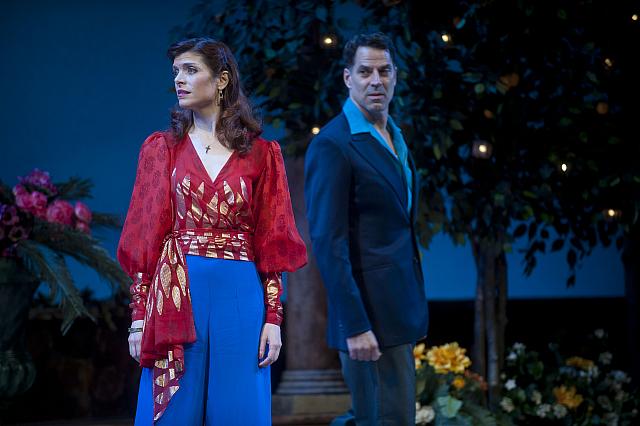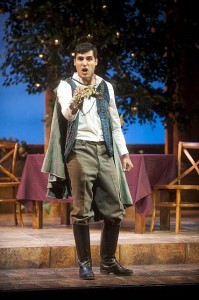Fuse Theater Review: Barrington Stage Company Serves up a Lavish “Much Ado”
From the first clearly projected lines to the last, it’s obvious that director Julianne Boyd set out to direct a production of Much Ado where language rules supreme.
William Shakespeare’s Much Ado About Nothing. Directed by Julianne Boyd. At Barrington Stage, 30 Union Street, Pittsfield, MA, through August 25.
By Helen Epstein.
In Julianne Boyd’s short and personal director’s note to her production of Much Ado About Nothing at Barrington Stage, she writes that while Shakespeare was an Englishman, his sources were Italian. The play is set in Messina, Sicily and to Boyd, who is “an Italian-American (and half-Sicilian),” “the men and women in this play are truly Sicilian. The subjects that come up time and again—honor, loyalty, virtue, a woman’s role in a patriarchal society—is a world I know well.”
Much Ado is also Boyd’s and Barrington Stage’s first foray into Berkshires territory where Shakespeare & Company has held the local franchise on the playwright for the last 35 years. I was curious to see what the company would do with this old chestnut, a fore-runner of screwball comedy that is one of Shakespeare’s most accessible, quotable, and produced works. (As Boyd’s production opened, Joss Whedon’s film modernized adaptation was playing in Massachusetts theaters).
As is frequent at Barrington Stage, the audience is welcomed into the play by a sumptuous, hyper-realistic set, this one by Michael Anania. It is 1936. A guitarist and mandolinist are sitting on a stone bench strumming songs against a bright blue sky framed by stone arches. Then the lights dim, and a messenger arrives to announce that the troops are returning victorious from the war in Abyssinia. In his sun-drenched courtyard—replete with marble columns, orange-studded trees, and massive urns of flowers—Leonato, Governor of Messina (winningly played by Philip Kerr) comes forward to greet the veterans.
From the first clearly projected lines to the last, it’s obvious that Boyd set out to direct a production where language rules supreme. Voice and text coach Claudia Hill-Sparks has done excellent work. The actors speak the words naturally, intelligibly, and audibly. The pace sometimes suffers as a result—at times the screwball-ness of the plot slows down—but this is a production that gives the viewer room and time to hear and ponder textual and thematic resonances both within the play and with other plays in the Shakespearean canon.

Gretchen Egolf (Beatrice) and Christopher Innvar (Benedick) in the BSC production of MUCH ADO. Photo: Kevin Sprague
The powerful men in Boyd’s patriarchal society are a cohesive lot. The male leads are played by an uncommonly strong group of actors who coalesce with the ease of a practiced ensemble. The versatile Christopher Innvar, whom I’ve enjoyed watching in many Barrington Stage productions, plays a jaded, utterly believable Benedick the steadfast bachelor. The younger and very gifted Babak Tafti, who starred in last year’s North Pool, plays a persuasively ingénue-like Claudio. They are ably supported by Gordon Stanley, David Bishins, and Mark H. Dold.
I found Boyd’s take on the women to be more problematic. Gretchen Egolf’s version of Beatrice is clearly inspired by actress Katherine Hepburn, to the point that at times she seemed to be attempting an impersonation of the late star, complete with hairdo, costumes, and mannerisms. In fact, both Egolf and Christina Pumariega’s Hero lacked nuance; both seemed more like caricatures than characters, aided and abetted by a supporting cast of giggling, girlish waiting women. Instead of trusting Shakespeare’s text to delineate the boys from the girls as well as Beatrice’s considerable difference from the average Sicilian woman, Boyd hammered in what Shakespeare makes plain in his text. I found that her broad direction of the comic constable Dogberry (John Cariani) did the same.
Still, with whimsical costumes by Sara Jean Tosetti, an original “period” score and dances—including a masked ball with fabulous masks—Boyd and the BSC deliver a lavish and lovely vision of Much Ado.
Helen Epstein is the author of Joe Papp: An American Life and the co-publisher of Plunkett Lake Press eBooks of Non-Fiction.
Tagged: Barrington Stage Company, Berkshires, Julianne Boyd, Much Ado About Nothing

